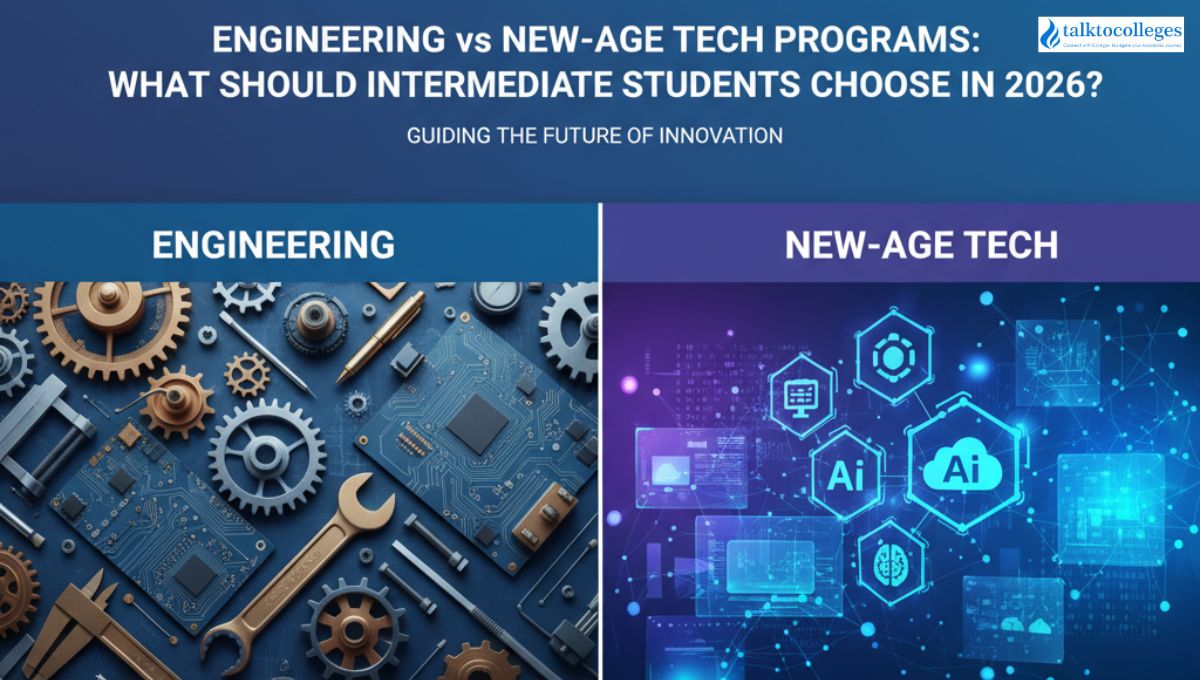The Class 12 board exams are behind
you, and now the real question looms large: “Which course should I pick?”
With hundreds of programmes, dozens of entrance tests, and every well meaning
relative offering advice, it’s easy to feel overwhelmed. Relax! Choosing the
right course is a process, not a one shot decision. This blog walks you through
that process step by step, using simple Indian English, so you can make a
confident and professional choice about your future.
1. Know Yourself
Before Knowing the Options
a. List your
interests and strengths
Spend a weekend jotting down subjects you genuinely enjoy, hobbies that
energise you, and the school projects where you performed best. A passion for
coding, a flair for public speaking, or an eye for design are important clues.
b. Check your
aptitude
Free online aptitude tests or career counselling tools help identify natural
abilities. They’re not destiny, but they highlight areas where you may excel
with less effort.
c. Map your
personality
Are you extroverted and people oriented? You may thrive in sales, hospitality,
or media. Prefer quiet analysis? Think data science, research, or accounting.
Matching personality with profession often leads to lasting satisfaction.
If you’re confused about how to align your passion with potential career paths,
consider taking career guidance
from certified experts. Career counselling helps you understand not only
your interests but also the available options that match your academic
background.
2. Research
Industry Trends, Not Just Popular Courses
India’s job market is evolving
rapidly. While traditional degrees (Engineering, Medicine, Law) remain solid,
new age fields like Cybersecurity, UX Design, Renewable Energy Management, and
Sports Analytics are booming.
- Look at growth data – Industry reports from NASSCOM,
FICCI, or sector specific think tanks reveal emerging opportunities.
- Track salary trends – Sites such as PayScale and
LinkedIn Salary show which roles command premium pay.
- Follow government initiatives – Schemes like “Make in India”,
“Digital India”, and the push for EVs influence future demand.
A quick example: Electric vehicle (EV)
manufacturing is leading to a surge in specialisations such as Battery
Technology, EV Design, and Charging Infrastructure Management—fields unheard of
a decade ago.
3. Understand
Course Structures & Entry Routes
Not all degrees are created equal. Use
college prospectuses and official websites to dig into:
|
Aspect |
Questions to
ask |
|
Curriculum
depth |
Does it balance theory and hands on
work? |
|
Duration &
flexibility |
Can you exit with a diploma after
Year 2 if plans change? |
|
Assessment
style |
Is it project based, exam heavy, or
internship driven? |
|
Accreditation |
Is the college AICTE/UGC/NBA/NMC
approved? |
|
Entrance exams |
JEE, NEET, CLAT, NID, CUET… which
one matches your target course? |
Pro tip: Many universities now offer dual degree
or major minor options—handy if you love both, say, Economics and
Data Analytics.
4. Evaluate
Return on Investment (ROI)
Education is an investment of money,
time, and effort. To gauge ROI:
- Tuition & living costs – Private colleges in metros cost
more than Central or State universities, but may offer superior industry
exposure.
- Average placement package – Look at the median salary, not
the highest ever CTC flashed in ads.
- Payback period – Divide total course cost by first year
salary; a shorter payback is obviously better.
- Scholarships & education loans – National Scholarships Portal,
state welfare schemes, and bank loan terms can ease the burden.
5. Shadow,
Network & Intern
Shadow a
professional in your shortlisted
field for a day or two. Observe their routine, challenges, and lifestyle.
Networking with seniors, alumni, and LinkedIn connections can clarify on ground
realities better than glossy brochures.
If possible, take a short
internship after Class 12—many startups welcome eager learners. A fortnight
in digital marketing or a month in a local CA’s office can confirm (or kill!)
your interest.
6. Keep a Plan B
(and C)
The competition for marquee institutes
is fierce. Always keep alternative colleges or related courses in mind. For
example:
- Plan A – MBBS
- Plan B – BDS, BAMS, or Veterinary Science
- Plan C – Allied Health Sciences like Physiotherapy or Medical Lab
Technology
Similarly, if JEE Main ranks don’t pan
out, private or deemed universities, state CETs, and even overseas options can
still offer quality engineering education.
7. Use
Professional Guidance Platforms
While Google searches help, structured
guidance speeds up decision making. At TalkToColleges, you can attend virtual summits, interact
with university representatives, and get personalised counselling—everything
under one roof. Their mentors help you compare curricula, understand admission
timelines, and predict your chances based on cut offs, saving you weeks of
confusion.
8. Decide with
Head and Heart
Ultimately, the “perfect course” is
where your passion intersects with market demand. If you adore art but
worry about income, look at fields like Animation, UI/UX, or Game Design—creative
yet commercially viable. Conversely, if you’re choosing a subject only because
it “sounds safe,” pause and ask whether you can stay motivated through three or
four rigorous years.
Write down:
- Top three personal interests
- Top three booming sectors you resonate
with
- Your preferred learning style (hands on,
theory based, creative)
Where these overlap is your sweet
spot.
9. Key Timelines
& Action Plan
- April–May (post boards) – Self assessment, shortlist courses.
- May–July – Entrance exams, career fairs,
counsellor sessions.
- July–August – College applications, counselling
rounds, document prep.
- September onwards – Loan processing (if needed), hostel
arrangements, orientation.
Stick this timeline on your study
table so nothing slips through the cracks.
Frequently Asked
Questions
Q1. Is it okay to
take a gap year after 12th to decide?
Yes, provided you use it productively—internships, skill courses, or entrance
coaching—so the gap adds value to your profile.
Q2. How do I
compare private and government colleges?
Look at accreditation, faculty credentials, lab infrastructure,
industry tie ups, placement data, and fees. Balance quality with affordability.
Q3. Can a
Commerce student switch to IT related fields?
Absolutely. BCA, BBA (Digital Business), and specialised certificates in coding
allow non Science students to enter the tech world.
Q4. What if my
parents want Engineering but I love Design?
Arrange a counselling session with neutral experts (such as those at TalkToColleges),
present industry data, and request a shadow day so they see the viability of
design careers.
Q5. How many
entrance exams should I attempt?
Focus on 2–3 main exams aligned with your top choices rather than spreading
yourself thin across many tests.
Final Thoughts
Choosing the right course after
Class 12 is a journey of self discovery, research, and strategic planning. Stay
curious, gather reliable information, and seek professional guidance where
necessary. Remember: your career is a marathon, not a sprint—pick a path
that motivates you today and sustains you tomorrow. When in doubt, log
on to TalkToColleges for expert advice tailored to your dreams.
Good luck, and may your next chapter
be both exciting and rewarding!




No comments yet. Be the first to comment!